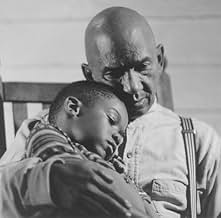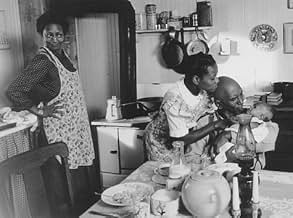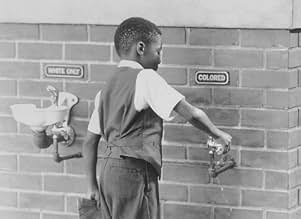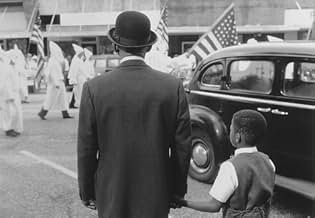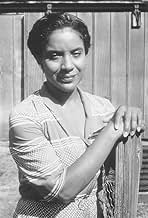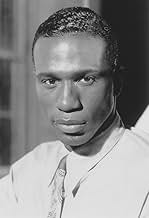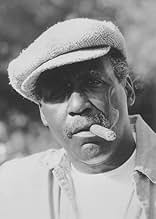Ajouter une intrigue dans votre langueA narrator tells the story of his childhood years in a tightly knit Afro-American community in the deep south under racial segregation.A narrator tells the story of his childhood years in a tightly knit Afro-American community in the deep south under racial segregation.A narrator tells the story of his childhood years in a tightly knit Afro-American community in the deep south under racial segregation.
- Réalisation
- Scénario
- Casting principal
- Récompenses
- 3 victoires et 2 nominations au total
Salli Richardson-Whitfield
- Miss Alice
- (as Salli Richardson)
Ray J
- Cliff (12 Yrs.)
- (as Willis Norwood Jr.)
Frank Hoyt Taylor
- Straw Boss
- (as Frank Taylor)
Avis à la une
Tim Reid has not been that guy from WKRP' for some time now. And no, he wasn't Isaac on The Love Boat either. He still finds himself in too many schlocky TV movies, and weak situation comedies. One must pay the rent, and no one can argue with that.
More and more a champion of black film, he has been careful, deliberate in his choice of projects. Once Upon a Time When We Were Colored, elevates him, appropriately, as a serious filmmaker, black, white, or otherwise.
This is not a new' film, but it is a different approach. An insightful look into Afro-American existence during turbulent times, the focus is on the community, rather than the oppression, the individuals rather than the cause. The result is every bit as effective in getting the message across. You get more flies with honey '
Al Freeman Jr. gets a well-deserved opportunity to show that he's not just some kind of TV Morgan Freeman. His portrayal of Poppa, the family patriarch is wonderful and slighted unfortunately by the Academy. Even the Image awards overlooked him, preferring to bestow honor on the over-cooked and under-talented Phylicia Rashad, one of the only weak links in this strong cast. Bernie Casey and Richard Roundtree both play well against their macho-type.
Don't expect to be hit over the head with the ideas of this film. Just let it ease you on down the road, and, take a look around, every so often as you do.
More and more a champion of black film, he has been careful, deliberate in his choice of projects. Once Upon a Time When We Were Colored, elevates him, appropriately, as a serious filmmaker, black, white, or otherwise.
This is not a new' film, but it is a different approach. An insightful look into Afro-American existence during turbulent times, the focus is on the community, rather than the oppression, the individuals rather than the cause. The result is every bit as effective in getting the message across. You get more flies with honey '
Al Freeman Jr. gets a well-deserved opportunity to show that he's not just some kind of TV Morgan Freeman. His portrayal of Poppa, the family patriarch is wonderful and slighted unfortunately by the Academy. Even the Image awards overlooked him, preferring to bestow honor on the over-cooked and under-talented Phylicia Rashad, one of the only weak links in this strong cast. Bernie Casey and Richard Roundtree both play well against their macho-type.
Don't expect to be hit over the head with the ideas of this film. Just let it ease you on down the road, and, take a look around, every so often as you do.
It just touchdown little things that happened in the era didn't really stick to any things. And when it came to the very ending they could have delved into that a little more but they didn't. One thing that irritates me the most is that the lead character has a pretty terrible mother and it wasn't acknowledged in any way if this is a true story I wonder how he feels about the end result which sadly he probably like because it was an All-Star cast
7calm
This was a very nice, scaled down version of how it really was in the Deep South. The movie did not even begin to depict the real horror Blacks faced each day. There was just a hint of the KKK, Jim Crow and the plantation mentality Blacks had to endure. I kept waiting for those historical, explosive events, we all knew to be the law of the land, to explode onto the screen, but it never happened.
Life was unbearable; Blacks were looked upon as animals and treated as such. I walked away from this movie feeling like life was almost a bowl of cherries.
I find it so odd that people are tired of hearing about the Black experience but never get tired of all the holocaust movies. 6 million Jews were slaughtered over a 6 year period (approx) -- hundreds of thousand Blacks were hung, beaten, raped, shot, humiliated and abused to death over a period of 150+ years, not to mention the suicides that took place on the slave ships in route to America. Admittedly, the holocaust was an atrocity, hopefully never to be repeated, while discrimination of Blacks is still a reality. Too bad there are no great movies that tell the Black Plight the way it should be told.
Life was unbearable; Blacks were looked upon as animals and treated as such. I walked away from this movie feeling like life was almost a bowl of cherries.
I find it so odd that people are tired of hearing about the Black experience but never get tired of all the holocaust movies. 6 million Jews were slaughtered over a 6 year period (approx) -- hundreds of thousand Blacks were hung, beaten, raped, shot, humiliated and abused to death over a period of 150+ years, not to mention the suicides that took place on the slave ships in route to America. Admittedly, the holocaust was an atrocity, hopefully never to be repeated, while discrimination of Blacks is still a reality. Too bad there are no great movies that tell the Black Plight the way it should be told.
"Once Upon a Time When We Were Colored" (1996): Set in the deep American South, over the years 1946-1962, and told as biography, this is the story of one boy's memories of being raised in the Cotton & Bible Belt. He's poor, his family is in pieces, he's Black, he's surrounded by the KKK
and yet, this is a soft, even soft-focus look back at the people who DID provide community family, did not dwell on their poverty nor make their race the focal point of a normal day. We are so accustomed to angry, relentlessly violent films about the racial divides, this film could easily be taken as a Hallmark Card presentation
but SOMETHING about it tells me otherwise. Yes, problems are depicted, and yes, the times they were a-changin', but not as fast or dramatically as we've come to accept from the quick flip of a few pages in history class. I LIKE the pace of this film. It's slow, warm, often funny, occasionally sugary, sometimes sad or maddening, but for the most part it's a nostalgic look back at the GOOD parts of black author's childhood.
I kept waiting for the bad moments to happen, as so often they do in these reminiscent movies of growing up in the south, yet no real drama occurred. These were moments pieced together, and if that was the intent--it worked. True, a child's reflection of childhood would be pieces of memory chained loosely together, impressions of events, people, and times. However, when the movie ended I thought, "That's it?" There were fine performances; however, the plot seemed to soft-step around the real issues, such as the Jim Crow laws, segregated schooling, subservient wages, and escaping to the north to avoid the subjugation. We got breadth, when depth might have made a much more interesting plot line.
Le saviez-vous
- AnecdotesWhen Melvin tells the group of elders all the benefits of living up North, he says that Colored men even drive buses. Preacher Hurn replies "Shut yo' mouth!" Isaac Hayes wrote the theme to Shaft, les nuits rouges de Harlem (1971), and Richard Roundtree played the titular character.
- Bandes originalesMaybe Tomorrow
Written and Performed by Lionel Cole
Meilleurs choix
Connectez-vous pour évaluer et suivre la liste de favoris afin de recevoir des recommandations personnalisées
- How long is Once Upon a Time... When We Were Colored?Alimenté par Alexa
Détails
Box-office
- Montant brut aux États-Unis et au Canada
- 2 291 255 $US
- Week-end de sortie aux États-Unis et au Canada
- 75 675 $US
- 28 janv. 1996
- Montant brut mondial
- 2 291 255 $US
Contribuer à cette page
Suggérer une modification ou ajouter du contenu manquant


